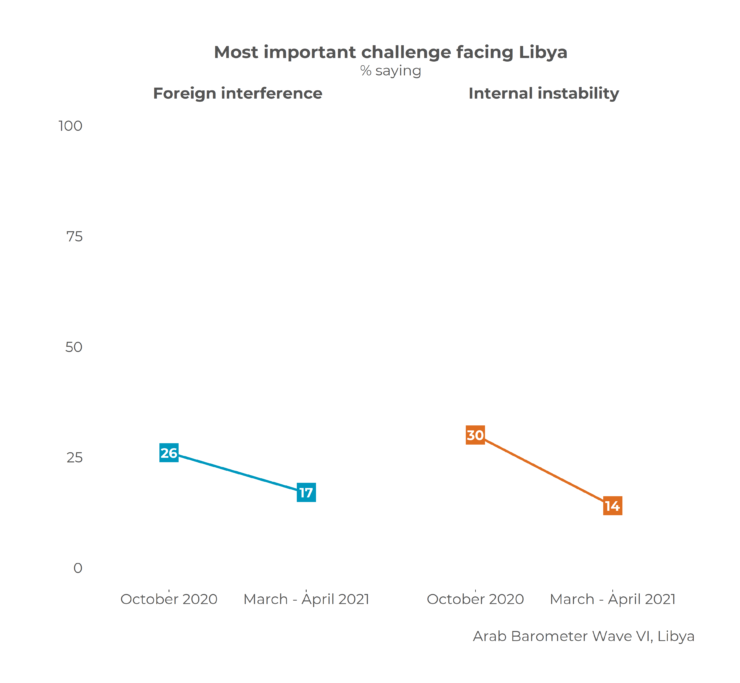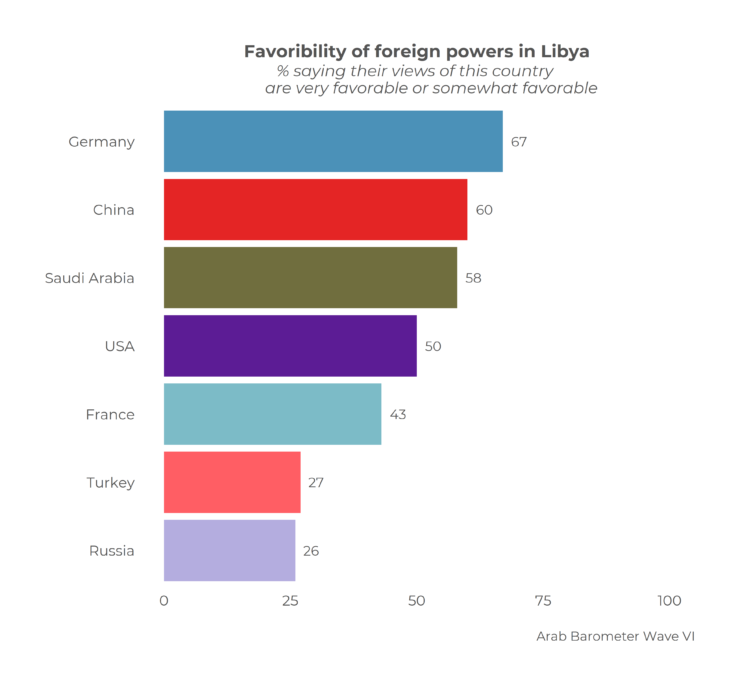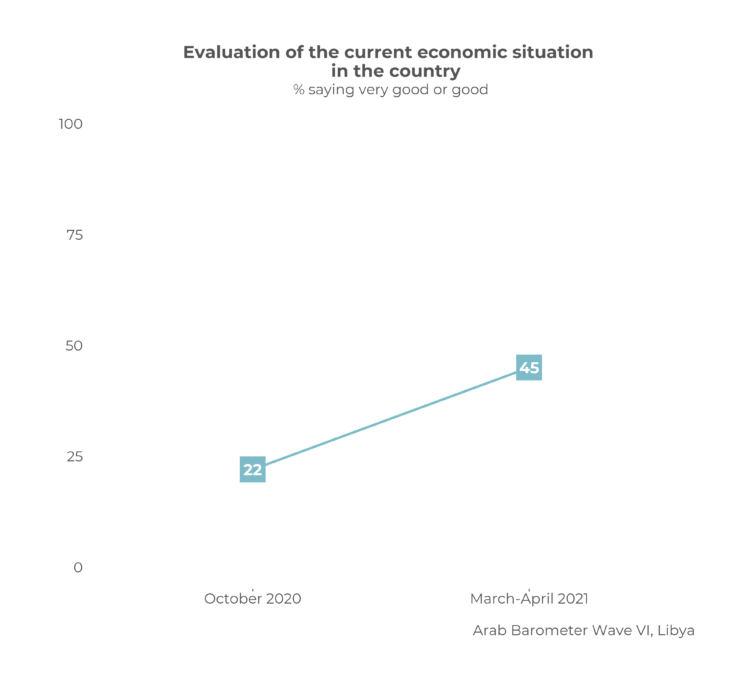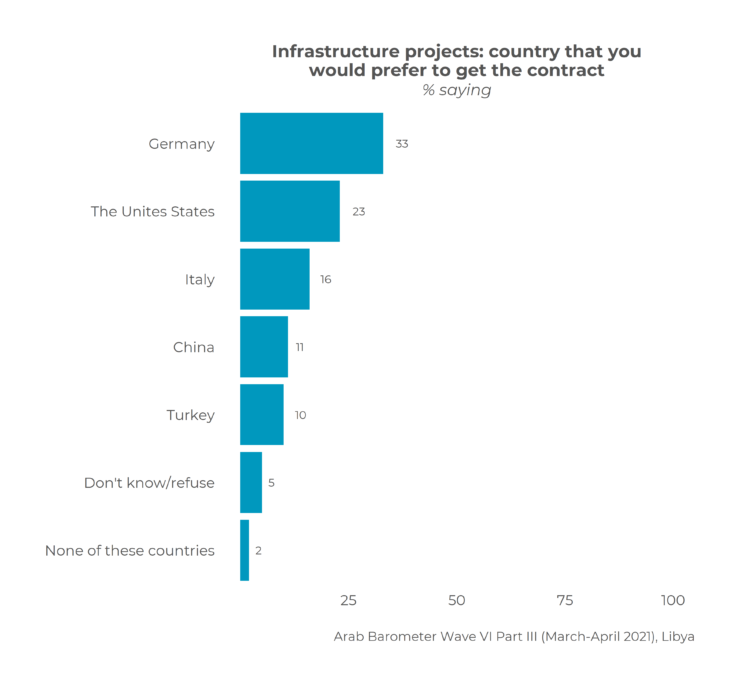The Libya Stabilization Conference, hosted in the Libyan capital, Tripoli, on October 21, 2021 is the first Libya-related international conference to take place inside the war-torn country since civil war broke out in 2014. According to the Libyan foreign minister, Najla al-Mangoush, the conference will focus on two tracks: the first is security and the second is economic recovery.
The security track aims to provide assistance and support to the Joint Military Committee 5+5 (JMC) to maintain the ceasefire and unite the Libyan military. The JMC was formed in January 2020 during the Berlin conference. It would take the JMC months of negotiations to finally reach a ceasefire agreement. On August 21, 2020 President Fayez al-Sarraj of the internationally-recognized Government of National Accords (GNA) and Aguilah Saleh, speaker of the House of Representatives allied with the Libyan Arab Armed Forces (LAAF) jointly announced the ceasefire. Two months later, the JMC signed a permanent ceasefire agreement that expanded the August agreement by including the withdrawal of all foreign mercenaries and forces within 90 days.
The agreement solidified the halt of hostilities between the GNA and LAAF. In October 2020, internal instability came first in the list of challenges facing the country with 30 percent of Libyans saying it is the most important challenge. As the peace agreement largely held and direct confrontations stopped for a few months, internal instability dropped to fourth place in the list of challenges with only 14 percent.
The agreement was not as successful, however, in limiting foreign interference. While 26 percent of Libyans said in October 2020 that foreign interference was the most important challenge, 17 percent said the same between March and April 2021 as several countries continue to interfere overtly and covertly.

During the 2019 war, both Russia and Turkey supplied their local allies with mercenaries. A year after the JMC peace agreement, a large number of those mercenaries are still present on Libyan soil. The direct involvement of Russia and Turkey is reflected in the relatively negative views Libyans hold of both countries. Only a quarter say they have favorable views of either country (27 percent for Turkey and 26 percent for Russia).

Other regional powers with less direct influence on the conflict fared much better than Russia and Turkey. Between August and September 2020, 58 percent of Libyans said they have favorable views of Saudi Arabia, compared with 43 percent for France and 67 percent for Germany in spring 2021.
The two global superpowers, the United States and China, too enjoy significant support in Libya. While half of Libyans say they have favorable views of the U.S., six-in-ten say the same for China. With all these countries participating in the Libya Stabilization Conference, the Libyan government hopes to garner more support from global and regional powers to carry out its mandate and lead a successful transition in the country.
One of the government’s main goals is to stimulate the economy and begin an economic recovery program. The halting of hostilities and new political agreement earlier this year has resulted in a steady oil production and a stable exchange rate, which translated immediately to improvements in the overall economy. In spring of 2021, nearly half (45 percent) of Libyans said the economic situation was very good or good, compared with less than a quarter (22 percent) saying the same in October 2020. Notably, Libyans still express optimism in their prediction of the economic situation in the upcoming years. In spring 2021, the majority said that the situation will be much better or somewhat better in the next 2 – 3 years (78 percent).

The question remains, however, on which countries are favored to take part in the economic recovery projects. While several countries are likely eager to land some of Libya’s infrastructure projects, a few regional powers have already scored agreements with the Libyan government to do so. On September 16, 2021, Libya and Egypt signed 14 memoranda of understanding and six executive agreements in various fields including oil and gas, aviation, construction, and agriculture. A few months prior, Libya signed six agreements with Turkey in fields of electricity, aviation, media, and trade, among others.
Libyans, however, prefer other countries to carry out infrastructure projects. A third of Libyans (33 percent) say they prefer Germany to get the infrastructure contracts, while around a quarter (23 percent) say the United States and 16 percent say Italy. China and Turkey are less preferred with 11 percent and 10 percent, respectively.

The Libya Stabilization Conference is an excellent opportunity for the Libyan government to convey the message its people clearly hold, that foreign interference perpetuates the conflict and poses a significant challenge to the country. Libyans are eager to begin their process of reconstruction and they need trustworthy partners in the country’s journey towards economic recovery and development.



